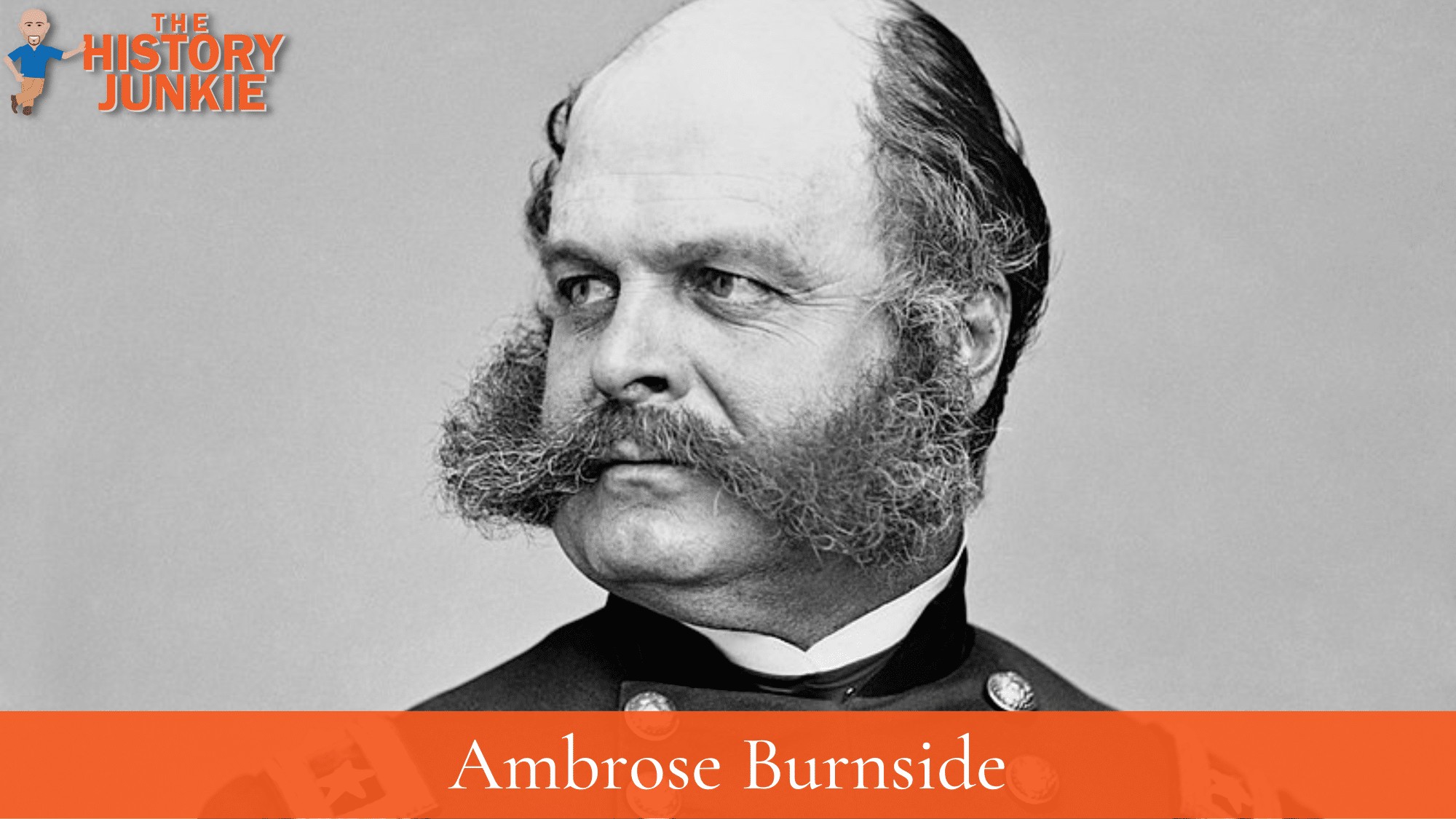Ambrose Burnside graduated from the United States Military Academy in 1847. At the outbreak of the Civil War, he organized the 1st Rhode Island Infantry, which was one of the first units to arrive in Washington, D.C., to offer protection to the Capitol.
Jump to:
Burnside commanded a brigade of infantry at the First Battle of Bull Run, where he was appointed brigadier general for his actions.
In September 1861, Ambrose Burnside was given command of three brigades known as the North Carolina Expeditionary Force. He launched an attack against the North Carolina coast, and his force was successful in achieving a foothold in the state. This resulted in Burnside's promotion to major general.
After General George B. McClellan was relieved of command of the Army of the Potomac following the Battle of Antietam, Burnside was appointed commander on November 10, 1862.
Burnside attempted a rapid approach to Richmond, Virginia, but this led to a costly Union defeat at the Battle of Fredericksburg on December 13, 1862.
The Union army suffered 13,000 casualties in the battle. This Union debacle, combined with a second failed attempt to attack Richmond, known as the "Mud March," caused Ambrose Burnside to be relieved of command on January 25, 1863.
Burnside went on to command the Army of the Ohio and the Army of the West during the remainder of the Civil War. He was a capable military leader, but he was also prone to making mistakes.
He was relieved of command of both armies, but he continued to serve the Union cause until the end of the war.
After the Civil War, Ambrose Burnside served as governor of Rhode Island and as a U.S. senator. He died in 1881.
Ambrose Burnside understood his limitations and offered to resign multiple times. He did not have the stomach that was needed to fight in the Civil War, but he made an excellent politician afterward.
His popular facial hair became a cultural term and was eventually called sideburns, named after him.
Family Overview
Ironically, Ambrose Burnside came from an English family who remained loyal to the Crown during the American Revolutionary War. They lived in South Carolina, where loyalists and patriots clashed violently.
After the war, his grandfather moved from South Carolina to Indiana Territory, where they remained. His father would pursue a life in the law and become a judge. This would give Ambrose and his other siblings opportunities that they would not have had otherwise.
Ambrose met his wife while he was stationed in Newport. The couple did not have any children.
Despite not having any children, Ambrose was looked up to by his siblings, and a nephew was given his name.
Family Tree Chart
Parents:
Edghill Burnside (1797 - 1859) - He was the son of a loyalist Captain during the Revolutionary War. After the war, his family moved to Indiana. Edghill married in Indiana Territory and would enter into a life of law. He became a judge and had 7 children.
Pemela A Brown (1795 - 1841) - Her family was also from South Carolina but migrated to Indiana, where she met her husband. The couple had 7 children prior to her death.
Spouse:
Mary Richmond Bishop (1828 - 1876) - She met Ambrose Burnside while he was in the Army and stationed at Fort Adams in Newport. They were married on April 27, 1852. After his well-known service in the Civil War, they lived on Benefit Street in Providence and on Edgehill Farm in Bristol. Mary was Rhode Island's First Lady from 1866 to 1869.
Children: None
Siblings:
Cynthia Ann Burnside (1815-1879) - She was born shortly after the War of 1812 ended. It is unknown if she ever married or had any children.
Henrietta Burnside (1817-1846) - She married but died young with no children.
Henry Midleton Burnside (1819-1874) - He married and had five children. He suffered from mental health issues and eventually passed away suddenly.
Benjamin Franklin Burnside (1826–1877) - He and his wife married, and it is unknown if they had any children. His wife survived him by 14 years, and the two are buried together.
Ellen W. Burnside (1829–1898) - She never married and is buried near her nephew.
William Brown Burnside (1838–1838) - He died as an infant.
Thomas Burnside (1844 - 1921) - The half-sibling of Ambrose Burnside. He was the last of the burnside children to die. He married and had two children.

